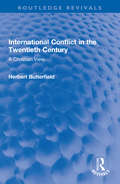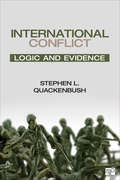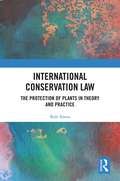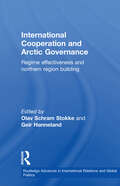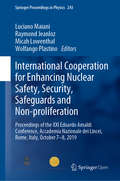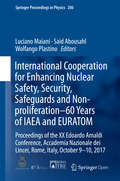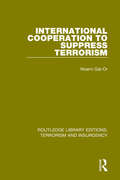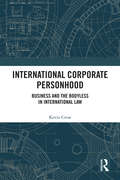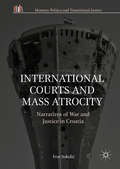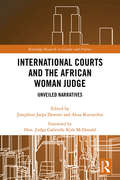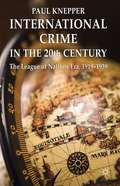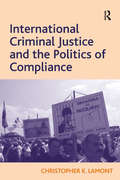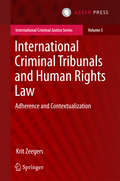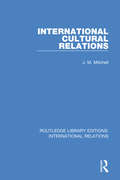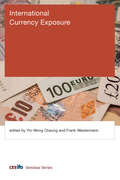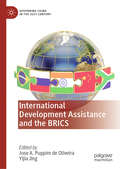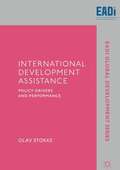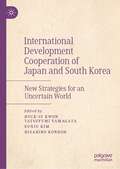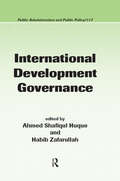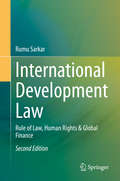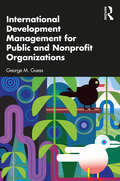- Table View
- List View
International Conflict in the Twentieth Century: A Christian View (Routledge Revivals)
by Herbert ButterfieldFirst published in 1960, International Conflict in the Twentieth Century considers how to solve the problem of human relations for external affairs. Stepping back from the more common focus on "current affairs", the book explores in detail the processes and patterns of history, the principles that underlie foreign policy, the ethical issues involved in international affairs, and the role of Christianity in a time of global revolution. In doing so, it covers a variety of topics including morality, scientific approaches to politics, lessons from history, and human nature. International Conflict in the Twentieth Century will appeal to those with an interest in religion and politics, religious philosophy, and religious and political history.
International Conflict: Logic and Evidence
by Stephen L. QuackenbushInternational Conflict: Logic and Evidence is based on the premise that proper understanding of international conflict – a necessary prerequisite for achieving peace – can come only from logic and evidence, not from opinion and anecdote. This groundbreaking book introduces students to international conflict’s key theories and empirical research. Throughout the text, author Stephen L. Quackenbush, Ph.D., gives examples that enable readers to see the theory in real-world events, and provides the data from the most recent research. Covering the entire process of interstate war, from causes of conflict to escalation, conduct, resolution, and recurrence, the book provides readers with a fascinating, thorough study that will help them understand how international conflict works.
International Conflict: Logic and Evidence
by Stephen L. QuackenbushInternational Conflict: Logic and Evidence is based on the premise that proper understanding of international conflict – a necessary prerequisite for achieving peace – can come only from logic and evidence, not from opinion and anecdote. This groundbreaking book introduces students to international conflict’s key theories and empirical research. Throughout the text, author Stephen L. Quackenbush, Ph.D., gives examples that enable readers to see the theory in real-world events, and provides the data from the most recent research. Covering the entire process of interstate war, from causes of conflict to escalation, conduct, resolution, and recurrence, the book provides readers with a fascinating, thorough study that will help them understand how international conflict works.
International Conservation Law: The Protection of Plants in Theory and Practice
by Rob AmosThrough a combination of theoretical and empirical approaches, this book explores the role of international environmental law in protecting and conserving plants. Underpinning every ecosystem on the planet, plants provide the most basic requirements: food, shelter and clear air. Yet the world’s plants are in trouble; a fifth of all plant species are at risk of extinction, with thousands more in perpetual decline. In a unique study of international environmental law, this book provides a comprehensive overview of the challenges and restrictions associated with protecting and conserving plants. Through analysing the relationship between conservation law and conservation practice, the book debates whether the two work symbiotically, or if the law poses more of a hindrance than a help. Further discussion of the law’s response to some of the major threats facing plants, notably climate change, international trade and invasive species, grounds the book in conservation literature. Using case studies on key plant biomes to highlight the strengths and weaknesses of the law in practice, the book also includes previously unpublished results of an original empirical study into the correlations between the IUCN Red List and lists of endangered/protected species in international instruments. To conclude, the book looks to the future, considering broader reforms to the law to support the work of conservation practitioners and reshape humanity’s relationships with nature. The book will be of interest to scholars and students working in the field of international environmental law and those interested more broadly in conservation and ecological governance frameworks.
International Cooperation and Arctic Governance: Regime Effectiveness and Northern Region Building (Routledge Advances in International Relations and Global Politics)
by Olav Schram Stokke Geir HønnelandA new exploration of the impacts of Arctic regimes in such vital areas as pollution, biodiversity, indigenous affairs, health and climate change. The post-Cold War era has seen an upsurge in interest in Arctic affairs. With new international regimes targeting Arctic issues at both the global and regional levels, the Northern areas seem set to play an increasingly prominent role in the domestic and foreign policies of the Arctic states and actors – not least Russia, the USA and the EU. This volume clearly distinguishes between three key kinds of impact: effectiveness, defined as mitigation or removal of specific problems addressed by a regime political mobilization, highlighting changes in the pattern of involvement and influence in decision making on Arctic affairs region building, understood as contributions by Arctic institutions to denser interactive or discursive connectedness among the inhabitants of the region. Empirically, the main focus is on three institutions: the Arctic Council, the Barents Euro-Arctic Region and the Council of the Baltic Sea States. International Cooperation and Arctic Governance is essential reading for all students with an interest in Arctic affairs and their impact on global society.
International Cooperation for Enhancing Nuclear Safety, Security, Safeguards and Non-proliferation: Proceedings of the XXI Edoardo Amaldi Conference, Accademia Nazionale dei Lincei, Rome, Italy, October 7–8, 2019 (Springer Proceedings in Physics #243)
by Micah Lowenthal Luciano Maiani Wolfango Plastino Raymond JeanlozThis open access book examines key aspects of international cooperation to enhance nuclear safety, security, safeguards, and nonproliferation, thereby assisting in development and maintenance of the verification regime and fostering progress toward a nuclear weapon-free world. Current challenges are discussed and attempts made to identify possible solutions and future improvements, considering scientific developments that have the potential to increase the effectiveness of implementation of international regimes, particularly in critical areas, technology foresight, and the ongoing evaluation of current capabilities.
International Cooperation for Enhancing Nuclear Safety, Security, Safeguards and Non-proliferation–60 Years of IAEA and EURATOM: Proceedings Of The Xx Edoardo Amaldi Conference, Accademia Nazionale Dei Lincei, Rome, Italy, October 9-10 2017 (Springer Proceedings In Physics #206)
by Luciano Maiani Said Abousahl Wolfango PlastinoThis open access book examines key aspects of international cooperation to enhance nuclear safety, security, safeguards, and non-proliferation, thereby assisting in development and maintenance of the verification regime and fostering progress toward a nuclear weapon-free world. The book opens by addressing important political, institutional, and legal dimensions. Current challenges are discussed and attempts made to identify possible solutions and future improvements. Subsequent sections consider scientific developments that have the potential to increase the effectiveness of implementation of international regimes, particularly in critical areas, technology foresight, and the ongoing evaluation of current capabilities. The closing sections examine scientific and technical challenges and discuss the role of international cooperation and actions of the scientific community in leading the world toward peace and security. The book – which celebrates 60 years of IAEA Atoms for Peace and Development and the EURATOM Treaty – comprises contributions presented at the XX Edoardo Amaldi Conference, where eminent scientists, diplomats, and policymakers were able to compare national perspectives and update international collaborations.
International Cooperation to Suppress Terrorism (Routledge Library Editions: Terrorism and Insurgency)
by Noemi Gal-OrWith the rise of international acts of terrorism there has been a commensurate rise in the level of international cooperation in the suppression of terrorism. This book, originally published in 1985, is a detailed and authoritative study of the background to this cooperation, the ways in which it has developed and the obstacles to its proper implementation. Particular emphasis is placed on a study of the European experience of international cooperation, the Council of Europe Convention on the Suppression of Terrorism being used as a case study.
International Corporate Personhood: Business and the Bodyless in International Law
by Kevin CrowThis book tracks the phenomenon of international corporate personhood (ICP) in international law and explores many legal issues raised in its wake. It sketches a theory of the ICP and encourages engagement with its amorphous legal nature through reimagination of international law beyond the State, in service to humanity. The book offers two primary contributions, one descriptive and one normative. The descriptive section of the book sketches a history of the emergence of the ICP and discusses existing analogical approaches to theorizing the corporation in international law. It then turns to an analysis of the primary judicial decisions and international legal instruments that animate internationally a concept that began in U.S. domestic law. The descriptive section concludes with a list of twenty-two judge-made and text-made rights and privileges presently available to the ICP that are not available to other international legal personalities; these are later categorized into ‘active’ and ‘passive’ rights. The normative section of the book begins the shift from what is to what ought to be by sketching a theory of the ICP that – unlike existing attempts to place the corporation in international legal theory – does not rely on analogical reasoning. Rather, it adopts the Jessupian emphasis on ‘human problems’ and encourages pragmatic, solution-oriented legal analysis and interpretation, especially in arbitral tribunals and international courts where legal reasoning is frequently borrowed from domestic law and international treaty regimes. It suggests that ICPs should have ‘passive’ or procedural rights that cater to problems that can be characterized as ‘universal’ but that international law should avoid universalizing ‘active’ or substantive rights which ICPs can shape through agency. The book concludes by identifying new trajectories in law relevant to the future and evolution of the ICP. This book will be most useful to students and practitioners of international law but provides riveting material for anyone interested in understanding the phenomenon of international corporate personhood or the international law surrounding corporations more generally.
International Courts and Mass Atrocity: Narratives of War and Justice in Croatia (Memory Politics and Transitional Justice)
by Ivor SokolićThe extra-legal effects of international and domestic war crimes trials continue to puzzle researchers and practitioners. In the former Yugoslav states, the legacy of conflict and issues of transitional justice remains central in politics, society and culture. This book provides a new theoretical and methodological approach to one of these puzzles: why universal human rights norms become distorted or undermined when they reach local publics. It investigates the social and cultural contexts that transitional justice processes take place in by looking at how emotional everyday narratives can hamper the spread of norms in society. In Croatia, these narratives define how the public understands the rule of law, history and minority rights.
International Courts and the African Woman Judge: Unveiled Narratives (Routledge Research in Gender and Politics)
by Josephine Jarpa Dawuni Hon. Akua KuenyehiaA sequel to Bauer and Dawuni's pioneering study on gender and the judiciary in Africa (Routledge, 2016), International Courts and the African Woman Judge examines questions on gender diversity, representative benches, and international courts by focusing on women judges from the continent of Africa. Drawing from postcolonial feminism, feminist institutionalism, feminist legal theory, and legal narratives, this book provides fresh and detailed narratives of seven women judges that challenge existing discourse on gender diversity in international courts. It answers important questions about how the politics of judicial appointments, gender, geographic location, class, and professional capital combine to shape the lives of women judges who sit on international courts and argues the need to disaggregate gender diversity with a view to understanding intra-group differences. International Courts and the African Woman Judge will be of interest to a variety of audiences including governments, policy makers, civil society organizations, students of gender studies, and feminist activists interested in all questions of gender and judging.
International Crime in the 20th Century
by Paul KnepperBetween 1919 and 1939, crime received a prominent place on the international public agenda. This book explores the blueprint for twenty-first century international crime prevention - The League of Nations approach - which established institutions for confronting dangerous drugs, traffic in women and terrorist violence.
International Criminal Justice and the Politics of Compliance
by Christopher K. LamontInternational Criminal Justice and the Politics of Compliance provides a comprehensive study of compliance with legal obligations derived from the International Criminal Tribunal for the former Yugoslavia's (ICTY) Statute and integrates theoretical debates on compliance into international justice scholarship. Through the use of three models of compliance based on coercion, self-interest and norms, Christopher Lamont explores both the domestic politics of war crimes indictments and efforts by external actors such as the European Union, the United States and the Tribunal itself to induce compliance outcomes. He examines whether compliance outcomes do or do not translate into a changed normative understanding of international criminal justice on the part of target states.
International Criminal Law: Cases and Materials
by Roger Clark Ellen Podgor Lucian DervanInternational Criminal Law provides a set of teaching materials furnishing students with a grounding in the transnational issues likely to arise in federal criminal cases, and also in the law produced as a consequence of international efforts to impose criminal responsibility on the perpetrators of human rights atrocities. International Criminal Law offers, for teaching purposes, a collection of cases (mainly domestic) and other materials, together with notes and questions about those cases and materials. The Fourth Edition contains a new chapter on human trafficking.
International Criminal Tribunals and Human Rights Law
by Krit ZeegersThis book addresses the interpretation and application of human rights norms by International Criminal Tribunals (ICTs). Such Tribunals are widely heralded as human rights defenders. At the same time, however, they employ activities that necessary entail the risk of human rights violations: they conduct criminal investigations, arrest and detain individuals, and put them on trial. This book investigates this flip-side of the ICTs' relationship with international human rights law, and focuses on the ICTs' own interpretation and application of human rights norms. First, the book addresses whether and how ICTs are bound by human rights law, since unlike states, they do not sign or ratify human rights conventions. Second, the book provides an in-depth analysis of the way in which ICTs interpret and apply human rights norms, compared to the way in which these norms are interpreted in a traditional state-context. Relying on the unique circumstances in which they operate, ICTs have often deviated from generally accepted interpretations of human rights. The author critically examines this so-called contextual approach and seeks to recommend ways in which ICTs can improve their interpretative practice by giving due regard to the context in which they operate, while still providing adequate human rights protection. Addressing the ICTs' possible leeway in terms of contextualization, this book contributes to the broader debates about adherence to human rights norms in international law. Krit Zeegers is an Associate at Allen & Overy LLP, Amsterdam, and previously worked as a researcher / junior lecturer at the University of Amsterdam.
International Cultural Heritage Law in Armed Conflict
by Marina LostalThis book fills gaps in the exploration of the protection of cultural heritage in armed conflict based on the World Heritage Convention. Marina Lostal offers a new perspective, designating a specific protection regime to world cultural heritage sites, which is so far lacking despite the fact that such sites are increasingly targeted. Lostal spells out this area's discrete legal principles, providing accessible and succinct guidelines to a usually complex web of international conventions. Using the conflicts in Syria, Libya and Mali (among others) as case studies, she offers timely insight into the phenomenon of cultural heritage destruction. Lastly, by incorporating the World Heritage Convention into the discourse, this book fulfills UNESCO's long-standing project of exploring 'how to promote the systemic integration between the [World Heritage] Convention of 1972 and the other UNESCO regimes'. It is sure to engender debate and cause reflection over cultural heritage and protection regimes.
International Cultural Relations (Routledge Library Editions: International Relations #7)
by J. M. MitchellThis book, originally published in 1986, analyses and describes the significance of cultural relations in international affairs. It traces the beginnings of cultural relations in the 19th century and their evolution. Consideration is given to the nature and organization of global ‘cultural diplomacy’, with a particular focus on France, Germany, Italy, Japan and the USA. This book will be of interest to students in international affairs and modern history, but also to those working in government departments and agencies.
International Currency Exposure (CESifo Seminar Series)
by Yin-Wong Cheung Frank WestermannIssues in debates about foreign currency exposure—the denomination of liabilities or assets in foreign currency. The foreign currency denomination of contracts in international transactions can lead to international currency exposure at the country level with important economic and policy implications. When debts are denominated in foreign currency and revenues in domestic currency, exchange rate fluctuations can result in balance sheet effects for countries with either net asset or liability positions. Moreover, currency mismatch between assets and liabilities can be a cause for crises in developing and emerging economies. This book looks at the issues surrounding foreign currency exposure in today's increasingly integrated world economy.The contributors draw on cross-country as well as country-specific data. They consider international currency risk after the Swiss franc ended its one-sided peg with the euro, for example, and the foreign exchange positions of firms in Turkey and Russia. Other contributors take macroeconomic perspectives, examining the potential effects of exchange rate realignment, the pressure to appreciate on countries with current account surpluses, and the currency exposure in international trade. Finally, contributors consider the issue from finance and political economy perspectives, addressing the phenomenon of the forward premium puzzle and discussing geopolitical aspects ascending currencies. Contributors Fatih Altunok, Huseyin Aytug, Agustín S. Bénétrix, Jörg Breitung, Paul De Grauwe, Eiji Fujii, Peter Garber, Juann H. Hung, Signe Krogstrup, Philip R. Lane, Katja Mann, Arif Oduncu, Gunther Schnabl, Maria V. Sokolova, Cédric Tille
International Development Assistance and the BRICS (Governing China in the 21st Century)
by Yijia Jing Jose A. Puppim de OliveiraThis book aims to bring together a series of analyses on international development assistance in the BRICS, the group of countries that includes Brazil, Russia, India, China and South Africa. The BRICS states comprise approximately 3 billion people (~40% of the World’s population) and in terms of GDP account for 16.8 trillion dollars (~22% of the World’s economy). Over the last decade the loose coalition has evolved to become a formal partnership on both economic and political fronts. The first formal meeting of the then-four BRIC countries took place in 2006 during the United Nations General Assembly. This was followed in 2009 by the first summit of BRICS' heads of state, an event which has been convened annually ever since. On 3-5 September 2017, the ninth BRICS Summit was hosted in Xiamen, China. This book, an anthology of scholars based in BRICS countries, provides invaluable insights into the emerging global south coalition, and will be of interest to scholars, employees of NGOs, and China watchers.
International Development Assistance: Policy Drivers and Performance (EADI Global Development Series)
by Olav StokkeThis book provides a comprehensive search for the basic political drivers of international development cooperation, based on the policy and performance of the OECD countries from the early 1960s to the present. The author focuses on the stated and implemented policies of the four so-called frontrunners and the Western hegemon, scrutinizing the changing trends in the justifications, objectives and guidelines set for the policy and their evolving performance vis-à-vis the international ODA target. Through extensive research, the work examines predominant world-views, societal value systems and foreign policy traditions, in order to find the policy drivers that vary nation to nation and how development assistance has evolved globally.
International Development Cooperation of Japan and South Korea: New Strategies for an Uncertain World
by Huck-Ju Kwon Tatsufumi Yamagata Eunju Kim Hisahiro KondohThis book examines the evolution of foreign aid policy in Japan and South Korea, analyzing policy rationales, institutional developments and policy choices. The book searches for new strategies of international development cooperation in an uncertain world. The book compares two countries’ policies in a unique way: pairs of Japanese and Korean scholars examine same policy themes in separate chapters, contrasting differences and similarities. This book will be of great value to scholars of international development cooperation, public policy and East Asian politics.
International Development Governance (Public Administration and Public Policy #Vol. 117)
by Ahmed Shafiqul Huque Habib ZafarullahThe establishment of good governance is a major challenge for the developing world, along with the need to sustain the progress resulting from developmental efforts. Although there are numerous studies on the development and governance of emerging nations, few volumes make a serious effort to bring together these two critical concepts.International Development Governance combines the two concepts - development and governance - by examining the issues and problems faced by nations in their attempts to establish sustainable governance. This textbook also initiates discussions on the concept of development governance in an international context.The book fills the gap in existing literature by drawing upon the experience and expertise of scholars from a broad spectrum of knowledge. Their views explain the issues and problems with reference to a number of tools that could establish "development governance" and sustain it. The text offers in-depth examinations of developmental sectors, resulting in a textbook that will inspire future public officials, policy makers, and consultants to contribute to the betterment of life for citizens of developing countries.
International Development Law: Rule of Law, Human Rights & Global Finance (International Economic Development Law Ser. #Vol. 14)
by Rumu SarkarThis book describes how international development works, its shortcomings, its theoretical and practical foundations, along with prescriptions for the future. International Development Law provides the reader with new perspectives on the origins of global poverty, identifies legal impediments to sustainable economic growth, and provides a better understanding of the challenges faced by the international community in resolving global poverty issues. The text is structured into two basic parts: the first part deals with the theoretical and philosophic foundations of the subject, and the second part sets forth issues relating to the international financial architecture, namely, international borrowing practices, privatization, and emerging economies. In particular, the book provides new, innovative analysis on corruption as an impediment to sustainable development. The three interlocking facets of corruption are examined: transnational organized crime, Islamic-based international terrorism, and corruption within emerging economies and the international banking system. Thus fresh new analysis adds depth and clarity to a field that heretofore has been scattered and superficial. Finally, the “right to development” within the international human rights discourse is critically reviewed, particularly in light of new jurisprudence emerging from the African context.This book offers a fresh, new and balanced legal perspective on the development process. The text has been rigorously researched and has many practical facets based on the author’s professional experience within the international development field. It is an invaluable research and teaching tool since it takes a multidisciplinary approach to putting complex issues, legal trends and political questions into a clear, new perspective that is highly analytical as well as accessible to the reader. The author's elegant legal prose is both powerful and persuasive.
International Development Management for Public and Nonprofit Organizations
by George M. GuessManaging international development and aid programs often relies on trial and error and flexibility. Practitioners need a mix of management theory and field practice to prepare them for work in other countries—transitional, developing, wealthier, and poorer alike. Filling an important gap in the literature for graduate students and practitioners in the public sector, private firms, contractors, and nonprofit organizations that manage development assistance projects, this is a guide to dealing with core issues likely to be faced in doing field work.International Development Management for Public and Nonprofit Organizations offers an accessible primer on the basics of managing and motivating people, teams, and organizations. It focuses on challenges and opportunities to managing in difficult cultures and contexts, including hostile political regimes. The book takes a deeper look at management in four sectors: public finance, urban transport, K–12 education, and natural resources and the environment. Presented throughout the book are 28 cases, designed to stimulate critical discussions, as well as five technical exercises to allow integration of theory and practice. This textbook is supplemented by slides for teaching along with a sample syllabus. It is addressed to current and future international aid managers, including those enrolled in international management and international development courses at the university level. Professional development organizations, such as contractors, nonprofits, and donors, will also find the book a useful addition to their training materials.
